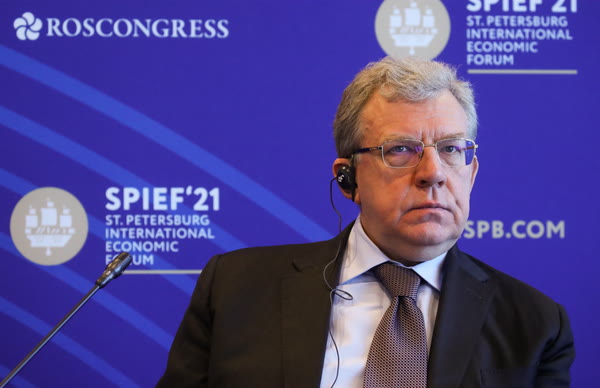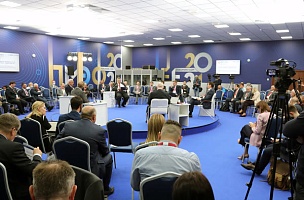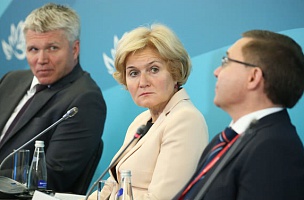KEY CONCLUSIONS
Innovation and social responsibility are key components for successful business in post-Covid times
"Social responsibility on both public and private levels is becoming very important. <...> Capitalism will, after all, go the way of taking care of each person individually. Each person becomes a greater value. <...> Ultimately, the value of both access to medicine and access to education grows even more important. <...> We will provide equal access to these essential social services and opportunities for children and for those who need them, regardless of their successfulness or where they are starting from," Alexey Kudrin, Chairman, Accounts Chamber of the Russian Federation.
"There is no doubt that the future will be digital. We have seen the consequences of digital technology even before the pandemic. And now that everything depends on Zoom and other digital ways of communicating, <...> there are many ways to use technological platforms for the benefit of our knowledge. <...> Over the last 40 years, the world has used digital know-how for extensive and sometimes excessive automation. <...> We are using technology to complete the tasks that humans used to complete," Daron Acemoglu, Economist, Co-author of the Book “Why Nations Fail: The Origins of Power, Prosperity, and Poverty”.
"Those companies that will be able to adapt to these new times will have more access to capital, they are the ones that will also work with consumers. They will be successful companies. Of course, this requires innovations, requires investments," Irina Bokova, Member of the Board of Directors, Independent Director, PhosAgro; Director General, United Nations Educational, Scientific and Cultural Organization UNESCO (2009-2017).
PROBLEMS
The pandemic has spurred new technologies that are radically changing resource economies and the labor market
"The reduction of the carbon footprint in all products, in consumption, falls doubly on Russia as one of the main suppliers [of resources - Ed.] The challenge before us is most acute. <...> Russia faces a double challenge: on the one hand we need to get rid of the most harmful materials still in consumption <...> but on the other hand we need to reduce this contribution in terms of exports to the world economy. And then, as a consequence, we will have to limit our foreign exchange earnings. <...> We will have to reduce our revenues from oil, for 20 years it will be a serious challenge," Alexey Kudrin, Chairman, Accounts Chamber of the Russian Federation.
"We use [technology- Ed.] to complete the tasks that used to be completed by humans. <...> In the United States, automation has unfortunately led to the displacement of people, although there has been a surge in a number of new positions, new jobs. These are market consequences. We began to use automation extensively, and the destruction of the middle class was one of the consequences of that," Daron Acemoglu, Economist, Co-author of the Book “Why Nations Fail: The Origins of Power, Prosperity, and Poverty”.
"After the pandemic, digitalization was necessary for survival. Now it is necessary for prosperity, <...> raising the level of labor, the level of profit, which leads us to the second priority, which is the improvement of the market situation, above all on the labor market. We have a mismatch between the labor army that we have now and the one that will appear tomorrow. And a widening gap between [economic - Ed.] inequality and equal opportunities in consumption. That gap will only keep growing if the world does nothing," Bob Moritz, Global Chairman, PwC.
SOLUTIONS
Improving the ties between the state and the civil society
"We need a more robust and technologically sound regulatory state. The union of state and business can have disastrous consequences, as we have seen in the past. <...> An increase in the power of the state must be balanced by an increase in the capacity for democratic participation of society. <...> To find a way out that would protect democracy, <...> we need to move from the bottom up. We need to empower the people," Daron Acemoglu, Economist, Co-author of the Book “Why Nations Fail: The Origins of Power, Prosperity, and Poverty”.
"We need to find a balance of interest for different stakeholders. <...> And keep in mind what is important for the consumer, for the population. <...> To take into account the point of view of the people – practice energy-saving, sustainability, careful approach to the use of mineral resources," Tim Myers, Chief Executive Officer, Arconic Corporation.
Set course on the development of IT and innovation
"If we talk about more dynamic economies, we have to say that private companies are developing better. I am talking about IT companies, pharmaceutical companies and other technology companies. <...> Russia must go step by step along this path. <...> The state should focus on the support of new creative industries, new centers of innovation. But it will be effective if it is mostly the private sector, private business," Alexey Kudrin, Chairman, Accounts Chamber of the Russian Federation.
"Now you can manage a mining company from an office in Moscow. You can automate the entire process, all the operating activities. <...> Of course, [in any case - Ed.] you need a certain number of people in the field, but you need to attract young people who would be happy to work in IT. And they <...> will be ready to travel around the country," Benedikt Sobotka, Chief Executive Officer, Eurasian Resources Group (ERG); Co-Chair, Global Battery Alliance (GBA).
For more information, visit the ROSCONGRESS.ORG Information and Analytical System.






